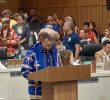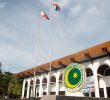Romulo Serot and his son Remly, volunteers of the DSWD’s cash-for-work program after they lost their house, were surprised to learn that they received an amount lower than what the department’s liquidation report posted. What appalled them more was someone else signed the job orders for them.
By JOHN RIZLE L. SALIGUMBA
Davao Today
COMPOSTELA, Compostela Valley, Philippines – Typhoon Pablo victims here complain of irregularities from the relief and rehabilitation program of the Department of Social Welfare and Development (DSWD), ranging from falsification of liquidation reports on the cash-for-work programs and lack of system in rehabilitation work.
Romulo Serot and his son Remly, volunteers of the DSWD’s cash-for-work program after they lost their house, were surprised to learn that they received an amount lower than what the department’s liquidation report posted. What appalled them more was someone else signed the job orders for them.
Based on the report, each of them received 350 pesos a day for 12 days of service or a total of 4,200 for each of them. But according to Remly, “We only got a total of 900 (pesos). My father’s share is 300 while mine was 600.”
Contrary to the report, Romulo worked for only a day. “I only worked for a day because I just borrowed the tools,” he said, complaining that DSWD did not provide for tools.
His son Remly only worked for three days and was contracted to receive 200 per day.
They said they were hired on the last week of December by a Mau-Mau Garcia who works in the local government office.
“We were paid right (away) in the bunkhouse (the relocation area they built),” said Remly, who received the pay for both him and his father. “We only signed on a piece of paper with a list of peoples’ names, but nothing like this (job order).”
But the DSWD denied releasing funds for the cash-for work program. Carmela Duron, head of the DSWD-XI Marketing Unit, clarified in a text message that “according to the local government unit of Compostela, they did not yet release (the fund).”
Duron added that “all DSWD bunkhouse construction are undergoing post-audit” by the Commission on Audit.
Josephine Hata, the camp leader of the “bunkhouse community” located in the University of Southeastern Philippines’ compound in this town was surprised to hear about the alleged “padding” of the liquidation report.
“Dakoa pud ana uy, og ugaling tinuod. Panloloko naman yan (If that’s true, it’s a very big amount. And that’s deception). The question is they have team leaders, and how come they do not know it?” she said.
No clear system
Aside from this anomaly, Hata also chided the DSWD’s programs for being inefficient and unsystematic.
Hata recalled how the DSWD sent 46 carpenters for constructing the bunkhouses. She observed that for two weeks these men worked without a clear system, “they (did) not provide enough tools. There were also no materials that the carpenters can use to repair houses, so they just went around looking for some.”
Hata said the amount spent on hiring the workers would reach around 150,000 pesos, which could have been better spent on buying housing materials and they would have rebuilt their homes.
She further said the bunkhouse was obviously not enough for the families displaced by the storm. She said there were 165 families staying in the USEP compound.
Hata added that when residents who occupied the town hall were sent home, they were afraid they might be next. When the bunkhouses were built, Hata fought for her neighbors to avail of them.
“These bunkhouses were supposedly built for residents of Mangayon, a far-flung village here in Compostela. We are qualified to occupy a bunkhouse because we have children,” she said.
The DSWD posted criteria for priority occupants: those who have children aged zero to two years old, who are living in danger zones and whose houses were totally destroyed, including those families who have a member that has disabilities.
Hata said that the DSWD would only allow one family per bunkhouse room. But she pleaded with the local government and the DSWD that they allow more families to enter since her neighbors reach to 53 families.
“We assured the LGU that we can keep the peace and cleanliness in the bunkhouses so we asked them to allow more than one family per room. I can’t imagine us living comfortably while our neighbors have no clear place for themselves,” she said.
Life in the bunkhouse
The bunkhouse “community” has set their own rules and formed committees to do tasks.
And with many residents without work after the banana plantations were hit by the storm, the bunkhouse “community” made their own means for livelihood, not expecting anything from the government.
“An organization hired some of us in building other structures. They pay those they hire 225 (pesos) per day. Another organization also pays two pesos each for a sheet of nipa roof we make. We also have reached an agreement to a livelihood proposal we made with an NGO,” she shared.
Hata said they have to rely on their collective action after seeing how food rations have been unsystematic.
“Ang paghatag sa bugas dili ra ba jud pareho, naay purok na grabe gyud ang rasyon (The distribution is not equal, some sub-villages have bigger rations),” she complained,
“Naa pa bugas na hasta gyung bahoa, naay gi-LBM. After sa katong inadlaw-adlaw, ang rasyon nahimo ng after 12 days, two weeks ug ingon nila basin once a month na lang (There was rice that smelled bad, and people had loose bowel movement. Their rations also became less, from daily to every 12 days, to two weeks, and perhaps once a month only),” Hata lamented.
She asked what happened to the assurance from the World Food Program that food supplies for survivors would be enough for six months.
Hata said because of this, the recent barricade of Pablo victims in Montevista town didn’t surprise her. “Normal, natural ra gyud to. Kung wala to mabuhat, wala sila murag na-aware diri nga iplastar nila (It was a normal, natural thing to happen. If that did not happen, they will not be aware of us here.” (John Rizle L. Saligumba/davaotoday.com)
bopha, compostela valley, davao del norte, davao oriental, dswd, dswd bunkhouses, Pablo








